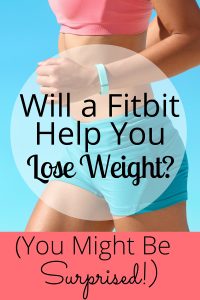
Fitbit via shutterstock
Fitbits are all the rage now – you can buy them at your local Costco, and Walmart sells them for as low as $69.00. Higher priced models go for over $200. Fans of the Fitbit have said it’s made them “addicted to exercise.” But if your goal is to lose weight, does the Fitbit really work? Is it worth its price?
This is my Fitbit experience.
I obtained my Fitbit for free as part of a Stress-Relief Research Study, so for me, it was priceless (literally). I found myself getting addicted to how many steps I could accumulate a day and longing to hit 10,000 so my Fitbit would flash and vibrate its approval. For two months now, I’ve watched it calculate my calories burned and how many steps or movements I’ve taken. It’s inspired me to go for more walks and hit the gym more frequently. So imagine my shock when I stepped on the scale and found I’d gained weight.
How did I gain 4 pounds in 2 months while wearing my Fitbit?!
I noticed my clothes were getting tighter and when my daughter walked in on me changing and said, “Wow, when did you get so blubby?” I decided to step on the scale and was shocked that not only had I not lost weight with the Fitbit, but I had gained. I decided to research whether or not I was the only one who this had happened to. Turns out I am not the only one. Perhaps the Fitbit overestimates the amount of calories we burn in a day or overestimates how many steps we take. Maybe the calories burned are based on calculations for people heavier than I. If you Google “Is my Fitbit making me fat?” you will see many dissatisfied customers and frustrated consumers.
The Fitbit does not count the calories consumed.
And if it did, it would be probably be inaccurate. When I started my Research Study, one of the women in the group asked the facilitator, “Does it count how many calories I put in my mouth?” Everyone laughed as if that would be preferable. And let me tell you, if they could come up with a Fitbit that could do this accurately, they will really be on to something. But since the Fitbit is unable to physically knock food out of my hand, it’s not really helping me lose weight.
Exercise alone won’t make you lose weight.
A recent article by The Washington Post advises consumers to “Take off that Fitbit. Exercise alone won’t make you lose weight.” In short, while exercise is important for health, “It’s calorie intake that is really fueling the obesity epidemic. But it’s not just the number of calories we’re eating as how we’re getting them.” I don’t each much junk food or fast food, but I can’t eat the way I did when I was in my 20s and that is catching up to me.
Despite the fact that the Fitbit hasn’t been my miracle fat-busting cure, I like it.
I enjoy pushing myself to take more steps (or movements – I have found that chopping vegetables instead of using a Cuisinart has shown up as “taking steps” on my Fitbit and tonight I hit 10,000 “steps” while vigorously petting my cat!). I don’t want to be sedentary and the Fitbit encourages me to be more active.
Should you decide on a Fitbit, which one is right for you?
Before you make an investment, you might want to take this quiz to decide which model is best for you and your lifestyle. They come in cute colors now, too, as well as waterproof models that you can wear while swimming.
Do you have a Fitbit?








I had a FitBit for a little while. I absolutely hated it! I ended up returning it to Costco two weeks later. I didn’t like that they’re so inaccurate. I paired it with MyFitnessPal to track my calories, but I still wasn’t very happy with the results. I think fitness trackers are absolutely wonderful and make people more conscious of their movement, but for me I think I need more accuracy to justify the investment.
I have long believed in “calories in, calories out.” I didn’t understand what you meant when you wrote , “But it’s not just the number of calories we’re eating as how we’re getting them.” “How” is obviously by mouth. Your sentence after that did not clarify for me. If part of an exercise program includes sufficient cardio activity, metabolism can be boosted and burn calories hours after that aspect of a workout.
Diane, the “how” came from a quote from The Washington Post. I think what they were trying to say is not all calories are created equal. That 300 calories worth of M&Ms is not the same as 300 calories of lean salmon. Sorry for the confusion.
Hi, Rachelle:
While it’s true the 300 calories are from a healthier source (salmon), 300 calories are still 300 calories. What is not burned off eventually will be stored as fat.
Diane, if you’re interested in this subject I highly recommend the book Why We Get Fat by NY Times writer Gary Taubes. It really deepened my understanding of calories and how we metabolize them. It’s a fascinating read and quite eye-opening.